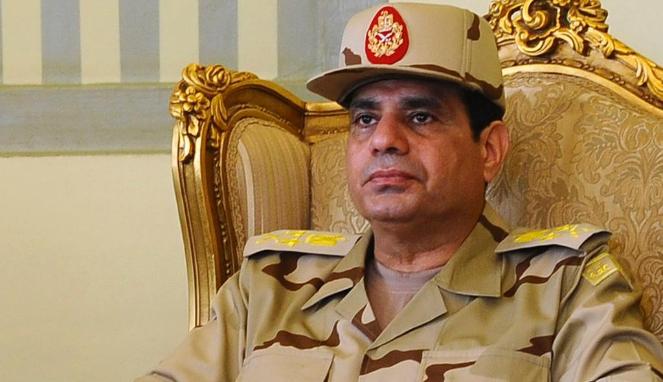Latest NEWS
- Aswat Masriya, the last word
- Roundup of Egypt's press headlines on March 15, 2017
- Roundup of Egypt's press headlines on March 14, 2017
- Former Egyptian President Hosni Mubarak to be released: lawyer
- Roundup of Egypt's press headlines on March 13, 2017
- Egypt's capital set to grow by half a million in 2017
- Egypt's wheat reserves to double with start of harvest -supply min
- Roundup of Egypt's press headlines on March 12, 2017
Egypt's generals back in favour after first flawed transition

By Edmund Blair
CAIRO, July 26 (Reuters) - When Egypt's army was last in charge, little more than a year ago, 27-year-old artist Mohamed Haroun painted a picture of the senior general surrounded by money looted from the state.
Now the army is back in control, he plans to sketch the new military chief plucking a drowning country from the sea.
"Tantawi was from the old regime," said Haroun, referring to Field Marshall Mohamed Hussein Tantawi, who ran Egypt from 2011 to 2012 after the overthrow of his former comrade-in-arms, Hosni Mubarak.
In contrast, Haroun said General Abdel Fattah al-Sisi, who pushed aside President Mohamed Mursi this month, "showed us he is one of us".
Many of those Egyptians opposed to Mursi say their admiration for the army has never wavered, and that any anger was always directed at the generals in charge.
In the turbulent world of Egyptian politics since Mubarak, a former air force marshal, was toppled, the military is seen as an institution that offers stability.
Haroun, like other Egyptian men, served in the army as a conscript, another reason why some view the army's rank and file as part of the national fabric.
While many ordinary Egyptians have clung to the military throughout, many of those who hailed the army's action in deposing Mursi had been at the forefront of calls for Tantawi and his troops to leave power, fuelled by the frequent crackdowns by soldiers on protests during that period.
Beneath graffiti against Mursi on walls that surround Tahrir, older slogans of "Down with military rule" are visible.
In the streets around the square where demonstrations have now brought down two leaders, Tantawi's soldiers armed with batons and shields had often charged and beaten demonstrators demanding civilian government.
CHEERING THE ARMY ON
In one act whose images went viral on YouTube in December 2011, soldiers dragged a woman along a road, exposed her blue bra and stamped on her, fuelling calls for Tantawi and his troops to go.
So some, often speaking in hushed tones, wonder how long Egyptians will cheer the army on this time, even if officers insist Sisi is not seeking power and will stick to a plan that could see elections in six months.
Sisi has appointed an interim president, Supreme Constitutional Court judge Adli Mansour.
"There were people who supported Sisi or didn't want the Brotherhood," said Hatem al-Dabaa, a 50-year-old owner of an antique shop in Cairo who is opposed to military rule.
"But when they see what the military rule will do, they will change their minds."
Mursi, a member of the once banned Muslim Brotherhood, became Egypt's first democratically elected leader last June when he won an election with 52 percent of the vote.
But that was not on 39-year-old Hanan Shaaban's mind when she bought a poster of Sisi, wearing dark glasses and brocaded peaked cap from one of the many vendors in Tahrir Square now selling his picture.
"The person who betrayed the state and betrayed the people was Mursi," she said, speaking from beneath an Islamic veil that left only her eyes visible.
Sisi, she said, is "a man who is worried about his country and worried about his people."
Alongside pictures of Sisi, hawkers sell images of Egypt's other military officers-turned-statesman.
Titled "Egypt's great" men, posters show Anwar Sadat, who was assassinated by Islamists in 1981, and Gamal Abdel Nasser, who turfed out the king in 1952 and cracked down on the Brotherhood and others two years later.
The vendors stalls show that Mubarak remains out of favour and is portrayed behind bars - standing in jail with Mursi in one poster. Until Mursi, all Egypt's presidents since 1952 had emerged from officer ranks.
FACING THE CONSEQUENCES
For now, public opposition to Sisi is mostly centred on Rabaa al-Adawiya, a junction on a Cairo thoroughfare where Islamists and others angry at the way Mursi was kicked out of office on July 3 have been staging a sit-in.
"We might have to stand up to the military and have their bullets tearing through our flesh," said Gehad El-Haddad, spokesman of the Brotherhood, whose father was an adviser to Mursi and, like the ousted president, is held incommunicado.
"But the rest of the Egyptian people will also face the consequences of not standing up to the military," he said, predicting a slide into dictatorship.
The Brotherhood insists it will stick to non-violent protests. But some worry the polarisation in society and the frustration of a more radical Islamist fringe could spur an Islamist insurgency like the one against Mubarak in the 1990s.
"After the last two years in this region, you have to say anything is possible," said one Western diplomat.
With a low-level civil conflict already being waged by militants in Sinai, Sisi called for rallies on Friday against "violence and terrorism." In response, the Brotherhood has called for counter demonstrations against the "military coup".
The street, where the army can still count on broad support for its intervention, has become the battle ground.
"In a sense it is mob rule," said Shadi Hamid of the Brookings Doha Centre, "and that lends itself to a very dangerous kind of politics." (Additional reporting by Shadia Nasrallah; Editing by Angus MacSwan)










